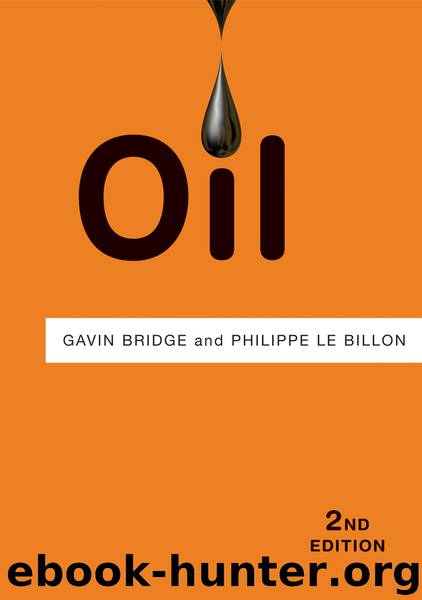Oil by Gavin Bridge Philippe Le Billon & Philippe Le Billon

Author:Gavin Bridge,Philippe Le Billon & Philippe Le Billon
Language: eng
Format: epub
ISBN: 9781509511761
Publisher: John Wiley & Sons, Inc.
Published: 2017-05-25T00:00:00+00:00
Energy security
The “security” of energy normally refers to the maintenance of a reliable supply at prices that are affordable to consumers yet profitable enough for producers to justify investments in future production. Intuitively appealing it may be, but a host of complications lies behind this simple definition. First, energy security and oil security are not the same thing. Oil is only one potential source of energy, and national and regional strategies to secure oil can work against broader goals of energy security. On its own, the desire of governments to secure oil supplies can distract attention (and divert resources) from strategies that seek to diversify the energy mix and enhance resilience to oil “shocks.” Fixed infrastructure can create a false sense of supply security and leave an importing country at the mercy of a political reversal, such as a sudden regime change in a long-allied major oil supplier, or of a natural disaster like an earthquake that results in multiple pipeline ruptures. Second, oil security does not mean the same thing for consumers, oil companies, or oil-producing countries. Cheaper oil may increase a sense of security for consumers, but it lowers investments by energy companies and revenues for energy-producing countries. A lack of investment leads to falling production volumes, increasing energy insecurity in the long term. Reduced production, if not offset by rising prices, can lessen revenues for producing countries and thus increase the risks of political instability. For governments of oil-producing countries, energy security means an ability to satisfy domestic energy consumption and the export markets vital to their economy.
Third, (in)security can arise out of the way the oil network is organized. State-driven models of organization raise concerns about political interference in access to reserves, distorted investment incentives, or restrictions on trade. Market-driven models, on the other hand, have left some governments anxious about supply as the oil market tightens. The vitality and adaptability of markets so valued by their proponents can also be a source of vulnerability. In 2012, for example, the largest independent refining company, PetroPlus, filed for insolvency, creating anxiety about the loss of gasoline, jet fuel, and other petroleum products from some of its refineries including Coryton, one of the largest refineries in the UK. The participation of sovereign wealth funds in the equity of now fully privatized “national” oil companies, such as the French company Total, has also raised concern about the degree of control and intentions of the foreign governments controlling these funds.
Fourth, (in)security arises from the way vulnerabilities and benefits are distributed along the production network. Global energy markets tend to spread risks among a large number of players, attenuating the impacts on individuals. The release of strategic oil stocks by wealthy industrialized countries, for example, can help all oil importers by decreasing global prices. Yet the transmission mechanism of a global market also means localized events can trigger broad chain reactions: a pipeline sabotage or unexpected refinery shutdown can send tremors throughout world oil markets. Fifth, efforts to “secure oil” by
Download
This site does not store any files on its server. We only index and link to content provided by other sites. Please contact the content providers to delete copyright contents if any and email us, we'll remove relevant links or contents immediately.
Life 3.0: Being Human in the Age of Artificial Intelligence by Tegmark Max(5521)
The Sports Rules Book by Human Kinetics(4356)
The Age of Surveillance Capitalism by Shoshana Zuboff(4260)
ACT Math For Dummies by Zegarelli Mark(4031)
Unlabel: Selling You Without Selling Out by Marc Ecko(3631)
Blood, Sweat, and Pixels by Jason Schreier(3587)
Hidden Persuasion: 33 psychological influence techniques in advertising by Marc Andrews & Matthijs van Leeuwen & Rick van Baaren(3529)
Bad Pharma by Ben Goldacre(3403)
The Pixar Touch by David A. Price(3396)
Urban Outlaw by Magnus Walker(3371)
Project Animal Farm: An Accidental Journey into the Secret World of Farming and the Truth About Our Food by Sonia Faruqi(3197)
Kitchen confidential by Anthony Bourdain(3058)
Brotopia by Emily Chang(3033)
Slugfest by Reed Tucker(2980)
The Content Trap by Bharat Anand(2894)
The Airbnb Story by Leigh Gallagher(2828)
Coffee for One by KJ Fallon(2608)
Smuggler's Cove: Exotic Cocktails, Rum, and the Cult of Tiki by Martin Cate & Rebecca Cate(2503)
Beer is proof God loves us by Charles W. Bamforth(2429)
